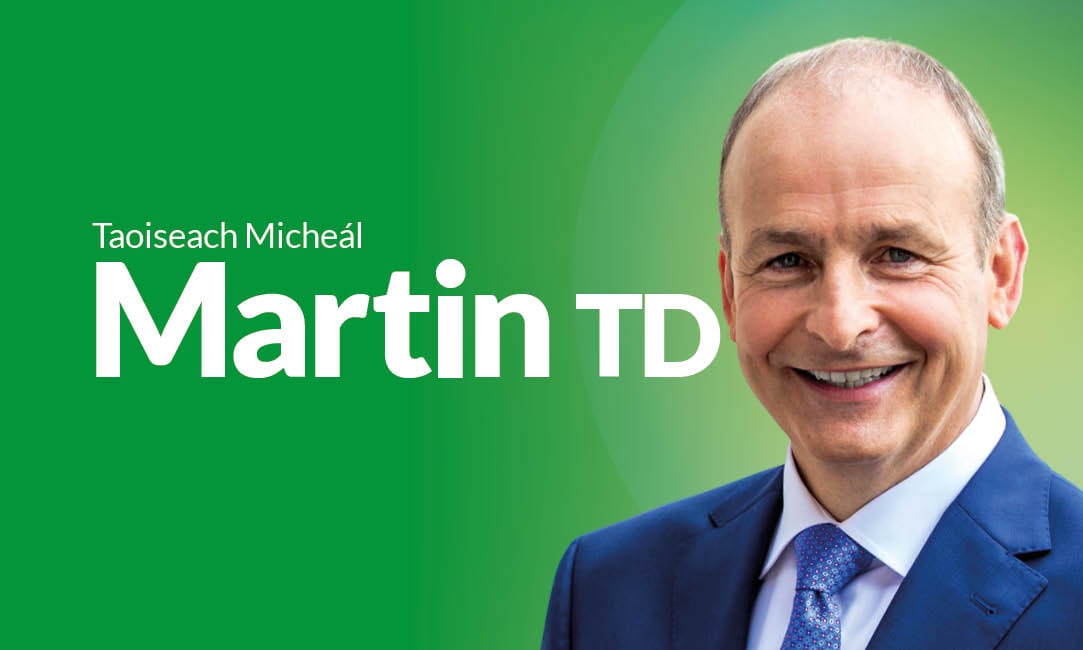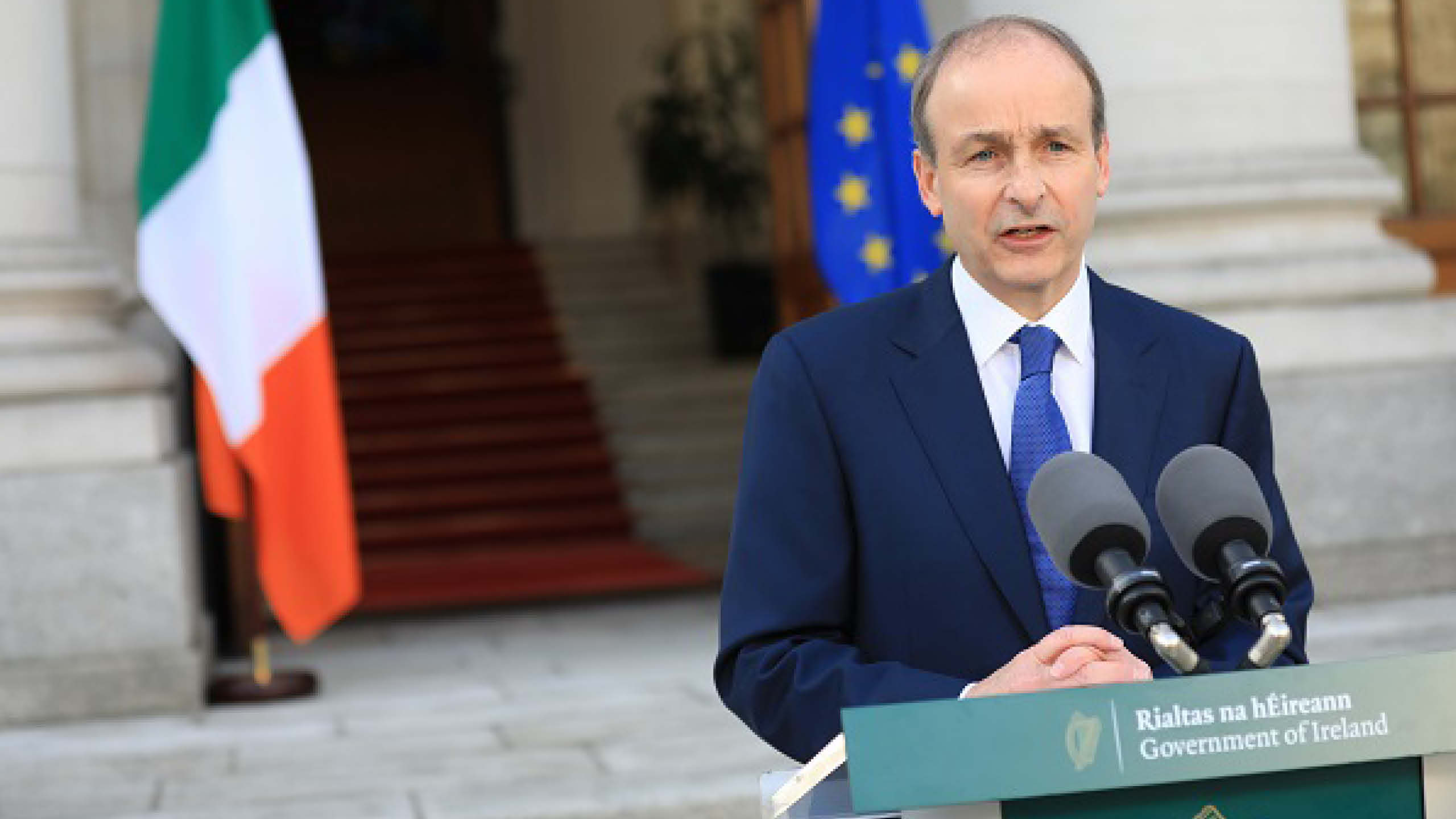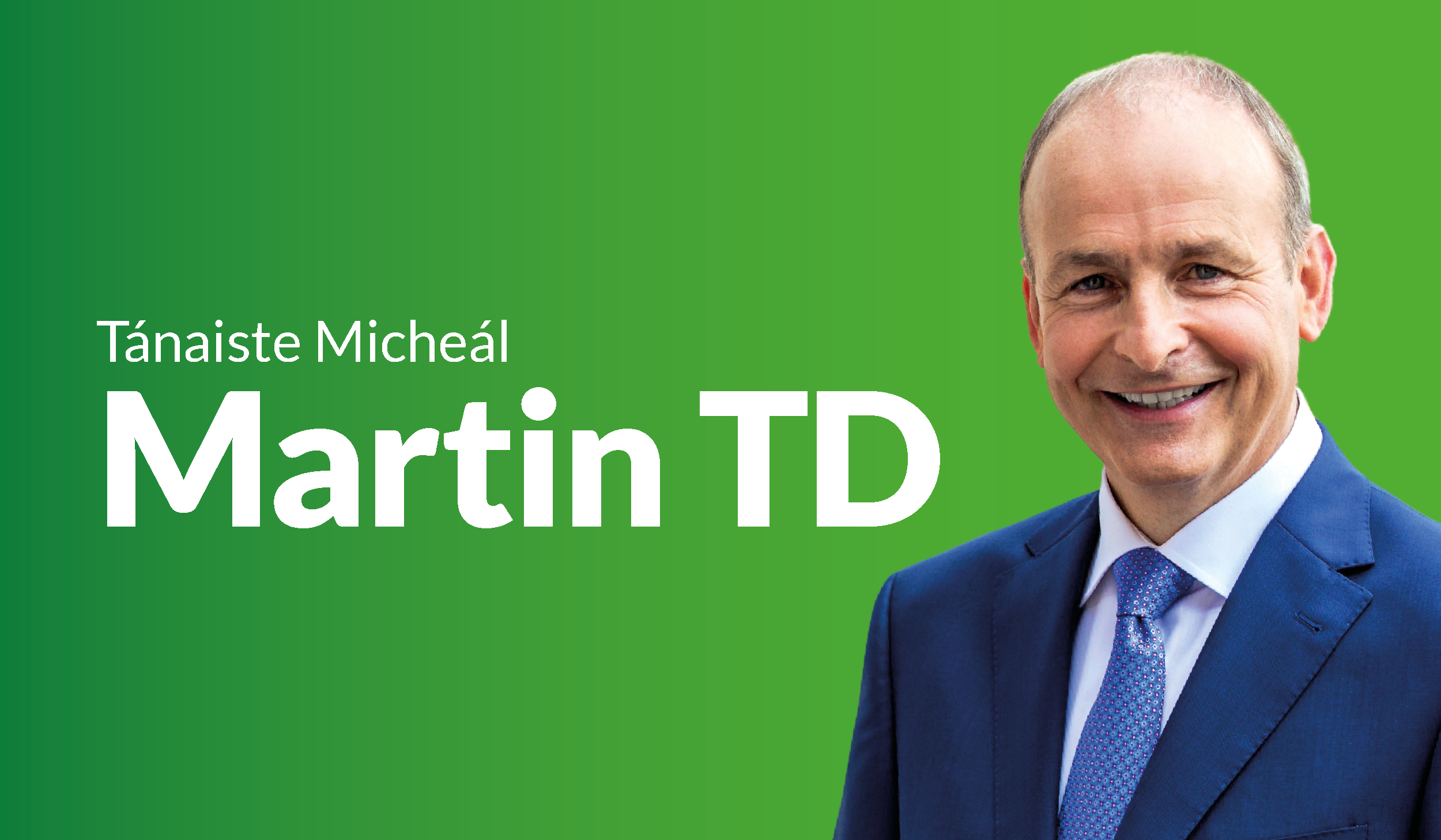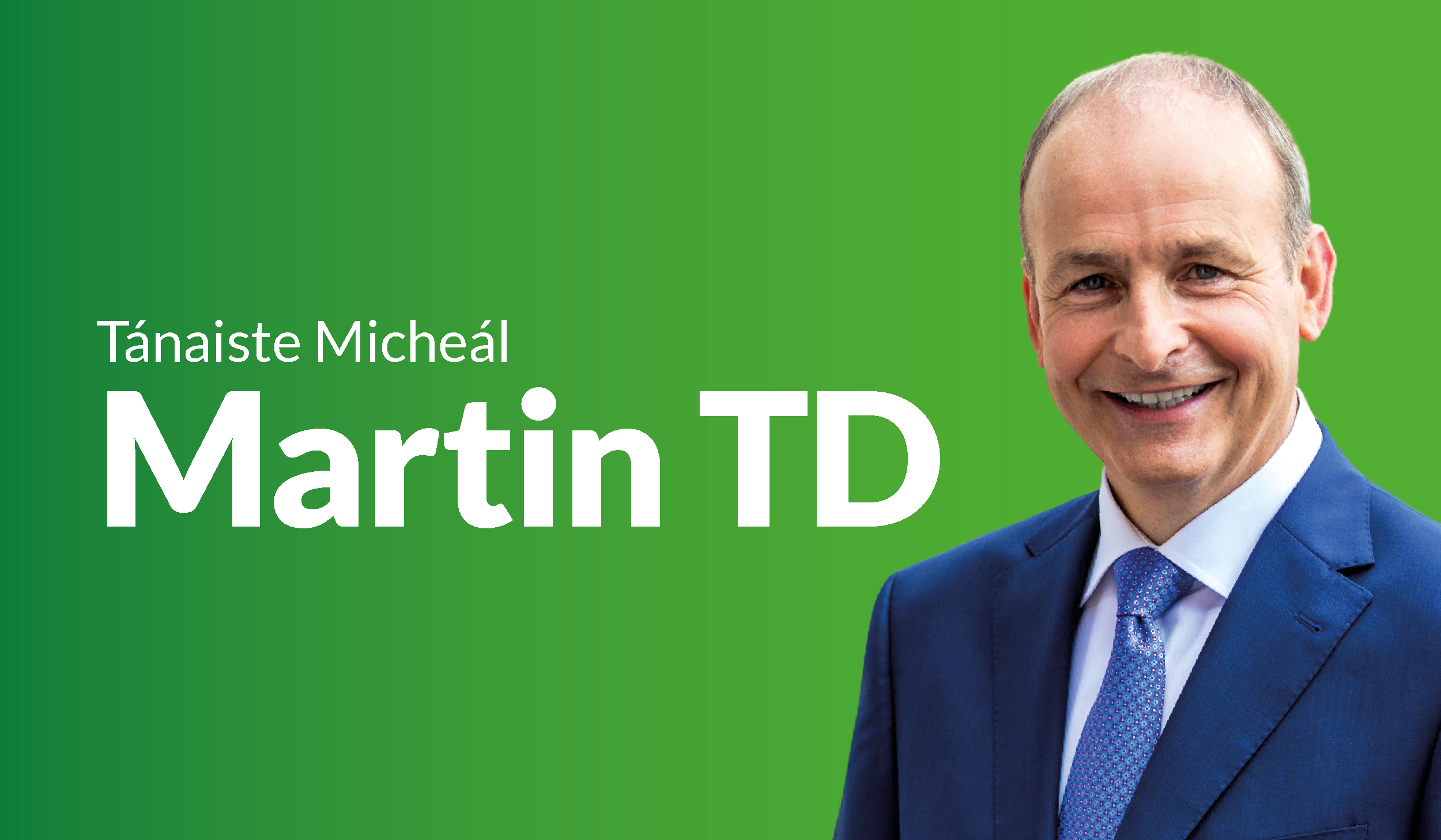Speech of An Tánaiste, Micheál Martin T.D.,Dublin Chamber Annual Dinner
Published on: 03 October 2024
Thank you, Mary Rose, and Siobhan, for your comments and for the kind invitation to be with you all this evening.
It is a particular pleasure to be here with former Congressman Joe Kennedy. From his work in tackling energy poverty to his highly effective time as a member of Congress he has rightly been recognised as a leader of real substance.
And he continues to be one of Ireland’s most active and important friends. His service as President Biden’s Special Envoy has brought a new momentum to the cooperation between our governments.
Joe, I look forward to hearing from you later and, once again, it’s great to see you here at one of the most important annual events for Irish enterprise.
This has been week of loud debate and commentary about the Budget for next year. And we are also at a moment of maximum political speculation. What would normally be viewed as nothing more than idle corridor gossip is being elevated to headline news.
It strikes me that a lot of people forget that the average Irish person does not wake up in the morning eager to spend the day guessing at election dates.
And a problem with a situation of fevered speculation is that it crowds out much more important matters.
I have never believed that political spin or the endless search for soft coverage is anything other than a distraction from the real business of fulfilling the democratic mandate of the people.
In the past Irish governments have often been known for being unstable or constantly distracted by short-term politics.
When this coalition government was formed it was on the very clear basis that we would not allow that to happen. Supported by the democratic votes of our members, we agreed a programme for a full mandate, and we agreed to operate to new standards of respect for each other and deep cooperation on a daily basis.
As Taoiseach, and now Tánaiste, I have always operated on the principle of working together with all members of the government irrespective of party.
We have had honest and robust debates, we have communicated directly and not through the media and have overcome genuinely dramatic challenges. And key to this is that we have all operated to our agreed agenda.
So, when it comes to the speculation of recent days, I have no difficulty in being absolutely clear.
At the start of the government and when key changes happened the three-party leaders reaffirmed each of our commitment to a process for completing our mandate. I can tell you equally clearly that nothing has changed. There have been no discussions about finishing our mandate early.
I have no reason to believe that anything has been changed and each of the three-party leaders has publicly and repeatedly reaffirmed that all decisions about completing our term will be discussed and agreed.
This is the approach which has been central to the government’s work for four and half years, so there is no reason to expect that there will be any change – particularly given the vital importance of key legislation currently before the Oireachtas.
We have to complete the financing of government fully and properly for this year and next.
We have to complete the most radical overhaul of planning in many decades – an absolutely fundamental requirement for accelerating home building and infrastructure development.
We have to enact vital new social legislation, especially in the area of mental health. We have to reform the libel laws to address problems which independent international bodies say are undermining press freedom.
Most of all we have to show that we can be true to our word in putting the people before politics.
Governing is much harder work than campaigning. It requires focus. It requires a willingness to listen, study and then act. What I believe are the real and sustained successes of this government over the past four and a half years were built by our determination to put the hard work of government ahead of politics.
We will finish our agreed agenda and then, in accordance with what we have repeatedly promised the public, we will turn to offering our new priorities for a new mandate for each of our parties.
Given the context of today, it is necessary to say all this again, as I have done many times in the past. However, I don’t want this evening to be dominated by the sort of short-term political debate we already have too much of.
I welcome this evening as an opportunity to talk about our country’s strengths, the challenges it faces and how much we can achieve in the years ahead.
I have always valued this dinner, and other events organised by Dublin Chamber because it is an organisation which reflects much of the progress Ireland has seen. In fact, the very origins of the Chamber show lessons which are as relevant today as they have ever been.
Over the course of nearly two and half centuries, Dublin Chamber has always been at the centre of the life of our capital city. It was founded as part of a wave of optimism which followed the granting of legislative independence to the Irish Parliament. In no way reflective of Dublin society at the time, and in fact a bastion of exclusion (at the time!), the Chamber nonetheless believed in cooperation as being at the core of successful enterprise.
Inspired by developments in different parts of Europe and America, the Chamber was a statement of self-confidence by a community which was profoundly international in its outlook.
Its members saw Dublin not just as a trading post, but as a place which could learn from and contribute to the economic and intellectual life of Europe and the wider world.
Today our country is one of the most economically developed in the world. We have a genuinely global presence in diverse fields of activity.
Of course we face very real challenges. Different sectors experience serious pressures, and the demand for more rapid progress in services and infrastructure is entirely justified.
But if you believe that nothing has been achieved until everything has been achieved what you are doing denying the reality of progress.
Ireland’s growth in recent decades saw us being willing to embrace a period of unprecedented change in the modern economy.
We continue to have many sectors which have highly traditional origins, but we also employ hundreds of thousands in sectors which didn’t exist thirty years ago.
However you define it, the Irish economic model has delivered deep and sustained progress for our country.
Where once we were a country known to the world for the depths of its poverty, now it is the scale of our achievements for which we are recognised.
Yet there is now overwhelming evidence of many people taking the economy for granted – casually assuming that employment and resources will always be available.
As it is through much of Europe and the wider world, a growing populist approach to economic and political issues is a force in today’s Ireland.
I passionately believe that we need to defend the Irish economic model, to strengthen it and to evolve it in this moment of history defined by rapid change and ongoing crises.
We have shown in recent years that our economy is, when supported by the right policies, highly resilient. But we have to renew our commitment to protecting its strengths and evolving to meet urgent challenges.
Resilience Through 4 Sustained Economic Shocks
One of the things missing in the debates of recent weeks is an appreciation of just how much our economy has gone through in the past five years.
Four international economic shocks in a row have made this one of the most intense and challenges periods we have ever had.
Firstly, we have had to manage the impact of the departure of our largest trading partner from the Single Market which we belong to.
This required major intervention to aid sectors in transition, investment in new routes to market and near-constant negotiations on future relations.
A wise professor in DCU said eight years ago that Brexit was ultimately about “making a few people happier and a lot of people poorer.”
The long-term impact of Brexit remains, but by any measure we have succeeded in limiting its damage here as much as possible.
The second major social and economic shock was of course the largest public health crisis in a century.
On the day I entered the office of Taoiseach unemployment was spiralling due to the lockdowns and there was sincere fear about the scale of lives and livelihoods which could be lost.
The pandemic had a terrible impact, and elements of this will live on for many years.
Yet Ireland showed its resilience.
We implemented a dramatic series of pandemic supports for businesses and workers. We knew that we had to protect as much as we could and then act to restart the economy as aggressively as possible when it was safe to do so.
We delivered one of the world’s most successful vaccination programmes and then we achieved Europe’s fastest economic recovery. Irish businesses were ready to bounce back - increasing employment and embracing new opportunities.
The next major shock was an international supply chain and inflation crisis which showed how vulnerable the modern economy is to disruption. Even before Russia’s imperialist aggression against Ukraine, supply-chain disruption had begun what was the worst period of high inflation for nearly half a century.
High inflation is one of the most economically destructive forces which can be unleashed. It hits living standards. In promotes fear. And it can become entrenched unless you take steady action.
Ireland succeeded in avoiding the worst levels of inflation seen elsewhere and thankfully today we are well below average. The balance of economic activity here, and a series of interventions to support productive capacity, made the critical difference.
However, the cost-of-living crisis caused by inflation is and remains a very real challenge.
In other countries it has been the start of a political radicalisation which is doing immense damage and threatening much worse.
That is why generous and ongoing aid for businesses and families is so important. Given the scale of the economy, the aid is proportionate to both the needs of those who are being helped and the likely inflationary impact. It is also reasonable given the external nature of much of the inflation.
I know that there are many who believe that we are being too expansionary. Their points are reasonably and sincerely made.
While they stand in contrast to the loud chorus attacking us for not being expansionary enough – I don’t believe in the politics of claiming virtue for simply splitting the difference.
As we work to manage the societal as well as the economic impact of a sustained cost of living crisis, we need to deliver greater support if the inflation of past years had not existed.
And we have to accelerate actions on a range of structural reforms to permanently address high costs for business and families.
The fourth major economic shock of our term in government is linked to the supply-chain and inflation crisis, but I think it has to be treated separately because it raises many fundamental questions about the future.
This is of course Russia’s imperialist aggression against Ukraine. This has been ongoing for over a decade but is now two and a half years into a full-scale war attempting to extinguish an independent European state.
This has starkly exposed how reliance on fossil fuels from an autocratic regime represents a permanent economic, political, and environmental threat to us and the wider democratic world.
The impact on energy prices was severe and remains significant. And so too does the urgency of permanently moving to a more secure, lower cost and sustainable source of energy.
We’ve dealt with a lot of the short-term impacts of high energy prices and there is a new level of determination behind proposals to implement a programme of investment and reform in energy. We have much further to go, but I believe we can see a clear way forward.
Renewing the Irish Economic Model
In some circles the past few years have been described as an “omni crisis.” I think that it is much more constructive to look at the very distinct elements of the series of crises we have seen, particularly here in Europe.
When we look at Ireland’s response to the four genuinely historic economic shocks of Brexit, Covid-19, supply-chain disruption and a war of aggression in Europe, we have a lot to reflect on, and most of this is positive.
Ireland has not only shown real resilience but has also shown the ability to respond quickly and effectively to new threats.
There are today over half a million people more at work than four and a half years ago.
We have a substantial fiscal surplus, and we are in a position to invest in our future.
These are not small achievements.
While there are many people who love to speak with certainty about what the future will bring, the only thing that is actually certain is that we will continue to face new and unanticipated challenges.
So, the one thing we have to do is to be absolutely clear about where we see our core strengths – and the policies which we believe are vital to protecting and growing our economy.
And the reality is that most of these policies are highly contested. We cannot take anything for granted.
I believe that there are core policies which we need to remain absolutely committed to if we are to protect and expand prosperity.
The first is that we need to be absolutely resolute in standing up for the values of free democracy and a strong Europe.
We can’t stand on the sidelines at a moment of deep political threat. We cannot indulge the sort of casual Euroscepticism and anti-western ideologies which unite those who oppose strong, rules-based cooperation between democratic states.
Ireland is today one of ten countries in the world which has been democratic for all of the last century.
We have prospered because we followed the vision of our great founding generation and the leadership of Seán Lemass in opening us to the world.
We remained resolute in our commitment to democracy in the face of sustained violence – and today the agenda has moved to one of peace, reconciliation, and shared prosperity.
We need to support a stronger, more effective, better-resourced European Union – and work with others to insist on fundamental rights and values.
And within this we need to redouble our commitment to open and fair trade between countries.
A return to the protectionism of the past represents a clear and present danger to prosperity for all countries.
It represents a move away from policies which have delivered the most sustained fall in poverty in human history.
Ireland must not fall for the populist and ideological anti-trade agenda.
And we must also commit ourselves to sustained investment in economic infrastructure. One of the reasons why I so strongly supported increased investment in the Budget for water, transport and electricity networks is that they are essential to a wide range of social, economic, and environmental objectives.
I believe that we must continue to ramp-up long-term investments in the productive capacity and sustainability of our economy.
We have to be clear in saying that pro-enterprise taxation policies are not an option for Ireland, they are essential.
They give certainty to businesses, and they recognise what I believe to be a fundamental truth – economic and social development go hand in hand. To achieve one, you must have the other.
I believe we must also redouble our efforts to support access and quality in education.
We could have achieved nothing as a country without a sustained improvement in education attainment. The latest OECD and EU figures show that we have just achieved record levels of both school completion and higher education qualification.
But just as our society and economy constantly evolve, so too must our education system.
We need sustained action to make sure that schools remain safe spaces where children can focus on learning rather than being constantly bombarded with distractions.
In much of the world public health doctors and educationalists have sounded the emergency bell about smartphones in schools.
We have to act with urgency and use solutions that are working in school systems in many other countries.
People who claim that clear plastic zipper bags are a credible way of ending smartphone use during schooltime are not serious people – and we need a far less superficial approach to urgent education discussions.
I have said many times that our higher education institutions must be helped not just to give people qualifications, but also to ensure that these qualifications are to the highest standards.
The financial pressures faced by our universities in particular are very real and I intend that the €150 million additional core funding we announced on Tuesday will be one part of an ongoing commitment to both access and excellence in higher education.
And of course, to secure our economic future we must build more homes.
Through a sustained commitment to new policies and investments we have succeeded in doubling home building from roughly 20,000 a year to 40,000 – and now we must go further, accelerating to 60,000 a year to meet both existing and future demands.
This requires structural change in planning, in infrastructure, in direct supports and in providing the long-term security need to unlock essential investments.
There can be no stop-start – and we cannot risk being diverted by outdated ideologies which didn’t work in the past and won’t work in the future.
Another area where we have taken a new approach, leading to significant and tangible benefits is the Shared Island Initiative.
The emergence of a stronger all-island economy was one of the benefits of peace, but when I became Taoiseach I wanted to dramatically extend the scope and impact of such benefit.
I established the Shared Island Unit, backed by a €1 Billion fund, to actually deliver infrastructure projects that had been talked about for decades, like the iconic Narrow Water Bridge on which construction has commenced;
to drive forward co-operation and research collaboration between the universities on our island;
to do the hard work of understanding the reality of society and the economy across the island;
and to reach out to and engage new generations of people here in a conversation about what they want for the future of this shared space.
The Shared Island Initiative is the most consequential North – South development in decades.
I am clear that it can be, and am dedicated to ensuring that it will be a driver for Reconciliation – a hugely important and impactful objective, with real impact on the ground.
I believe that Ireland’s future will be one of continuing to achieve sustained progress, of continuing to overcome both sudden and structural challenges.
But to do this we must acknowledge, protect, and build on core economic policies without which we cannot succeed.
We need a debate which is honest enough to acknowledge that many people want to take a very different route.
For my part I am absolutely convinced that we must go further in our commitment to a strong and effective European Union of democratic states.
We must speak up for the positive force that is international trade.
We must guarantee a pro-enterprise tax policy, investment in infrastructure and home building.
We must value, fund and promote both access and excellence in education and research.
Ireland has shown repeatedly that it is resilient, and that it can respond to unprecedented shocks.
But we can take nothing for granted.
We are a success because we have been willing to innovate and evolve – and this will be as much a part of our future as it has been of our past.
Tags:
Micheál Martin



